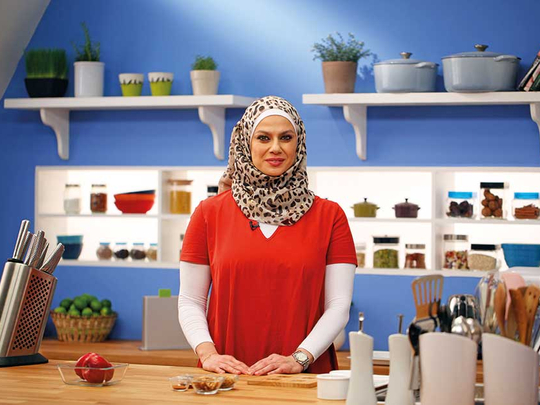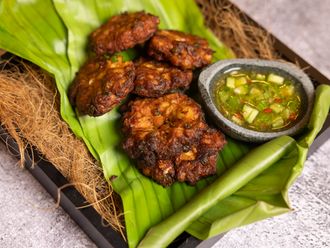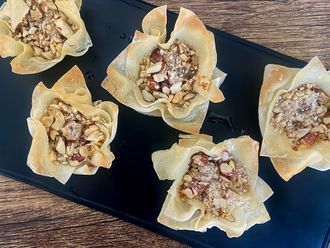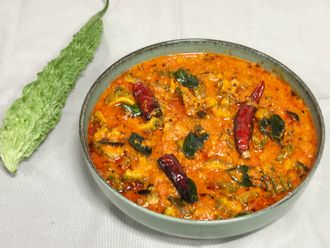
Leyla Fathallah
Family takes precedence for Leyla Fathallah, host of the Fatafeat TV shows Teslam Al Ayadi and Arousetna. The Beirut-born mum of three boys particularly enjoys Ramadan because it brings the extended family together over gargantuan meals.
“Ramadan for me is all about family and gathering together around the table for iftar,” she says. “I grew up in a family where I had many cousins of the same age as mine and we were like sisters and until this day we talk about those memories when we used to wait for iftar to enjoy the meal together.”
With our crazily programmed lives, she says finding time together can be hard, so she leaves nothing to chance. “In my family, we have a schedule where we book each other for iftar and suhour one week ahead to make sure we all get to gather during this holy month.”
And if she’s hosting, there’ll always be a soup (her family favourite is chicken and corn soup — “My kids and husband love it,” she says), there’ll be fattoush, the tart salad dressed in sumac and served with croutons, and fatteh, a comforting stack of bread, chickpeas and yoghurt that can be topped with vegetables.
Armed with a degree in culinary art from Le Cordon Bleu, France, the 42-year-old chef holds down a job at one of Lebanon’s top catering companies. And when she isn’t serving up enormous meals for her family, she’s in the studio or is hard at work on cookbooks. Her first book, Sit Beit, aims to simplify Lebanese recipes for kitchen newbies.
Healthy eating
In keeping with food trends across the region — a Kantar AMRB study found that home cooks are increasingly opting for recipes that are light on the stomach and on the pocketbook — Fathallah will use the seasons’ captive television audience to discuss nutrition and health issues. “My show this year is special because every episode has a theme which I discuss along with the dietitian and I accordingly provide recipes with the ingredients that help the theme or the problem presented during that episode,” she says.
Outside the studio, she approaches meals with the same planning she dedicates to hosting iftars — and advises home chefs to do the same, especially when following new recipes. “First of all, buy all your ingredients ahead of time, once or twice per week so once you start with the recipe you can easily find all your ingredients available,” she says. “Secondly, prepare everything and make sure everything is in place according to the method of the recipe and read the recipe several times before starting the cooking process. Most importantly, cook with love, passion and be happy while doing it because you are doing it for the ones you love.”
Three tips
Leyla Fathalla’s dietary tips for Ramadan
1. Always drink water instead of drinking juices.
2. Avoid desserts and eat fruits and dried fruits instead.
3. Start your meal with a good salad that will provide you with all the nutrients and fills you up before starting with the main course.
LEYLA FATHALLAH’S CREAMY CORN SOUP
Ingredients
• 2 cubes chicken stock
• 2 cans creamed corn
• 2 tbsp milk powder
• ½ cup cooking cream
• 1 tbsp corn starch dissolved in ¼ cup cold water
• Black pepper to taste
Method
1. Empty the creamed corn into a bowl. Fill each empty corn can with boiling water and dissolve a chicken stock cube in each.
2. In a pot, add the chicken stock, creamed corn, milk powder, cooking cream and dissolved corn starch and mix well. Cook over medium heat until thick and creamy or until the desired consistency is obtained.
3. Sprinkle with black pepper before serving.
WAFIK BELAID
Some of the most flavourful dishes in the Arab kitchen come from North Africa, and perhaps the most recognisable proponent of recipes beyond hummus and habra nayyeh is Wafik Belaid. Often referred to as the King of Tunisian Culinary Art, the superstar chef dishes up hearty fare and delicate plates with equanimity on his Flavors of Maghreb show on Fatafeat, drawing on traditions from Tunisia, Morocco and Algeria. This season’s show offers new recipes and cooking tips, he says, and he looks forward to introducing viewers to new spices and condiments from North Africa.
As a boy, Belaid combined business with food in Ramadan. “When I was young I prepare fresh juice and fresh homemade bread and I used to sell it on the streets of our neighbourhood in the month of Ramadan,” he says. “It was so much fun to cook and do business at the same time.”
Ramadan in Tunisia
The holy month is one of religious worship but also of indulgence in Tunisia, he says. The country prepares for Ramadan days and weeks before the actual event, as bakeries create special sections for traditional sweets and pas¬tries and people queue up at supermarkets to stock up on food, Belaid says. Like everywhere else, it’s a time for family and friends. “In Ramadan, we are used to attending cultural events and simply sipping Arabic coffee or smoke water pipes in the old medina of Tunis, others visit neighbours and relatives to chat, exchange sweets or watch their favourite TV shows.”
Belaid talks of the Boutbila, a man whose job it is to wake people up for suhour, the morning meal before the fast. Similar to the Mesaharaty in Egypt, the Boutbila would cross through the neighbourhood, calling to people from the street. The tradition has been revived in recent years, Belaid says: “The Boutbila [now] does not only call people for suhour, but he personally distributes the suhour himself.
His own personal ritual is to follow the obligation to be generous and charitable. “For me now the tradition is to be an active member in charity associations that are specialised in preparing iftar and suhour for the needy,” he says. “Food wise, I am always trying explore all the different kinds of brik, a kind of Tunisian spring rolls.”
Exploring different foods allow a chef to innovate, which is something Belaid says keeps the Ramadan table interesting. “Try to stay creative,” he advises the home chef. “Always buy premium products to ensure that you get the best quality. And always be in a good mood while cooking to produce the best dishes,” he adds.
Three tips
Wafik Belaid’s dietary tips for Ramadan
1. Break the fast with warm water or a warm soup. This comforts the stomach after a long day of fasting, replenishes your body with fluids and helps prepare the digestive system for the food that is to follow.
2. Secondly, eat a lot of water-based vegetables such as cucumber and watermelon.
3. Thirdly, avoid eating a lot of salty food especially during suhoor.
WAFIK BELAID’S BAGHIRI
In French, the Tunisians call these crepes with a million holes. These super-easy honeycomb pancakes are particularly good at suhour, keeping the stomach full for the long fast ahead.
Ingredients:
• 300 grams flour
• 120 grams semolina
• 1 tablespoon sugar
• 12 grams instant yeast
• 10 grams baking powder
• ½ teaspoon salt
• 900ml warm water
• Butter and honey for serving
Method:
1. Mix together all the batter ingredients in a bowl then cover with cling film and set aside to rise until double in volume (this could take two hours or more — but can be left overnight in the fridge).
2. When ready to cook, grease a non-stick pan and wait until it’s very hot. Place a small amount of the batter to make a pancake. As it dries out, repeat until all the batter is used up. Serve with the honey and butter.
















